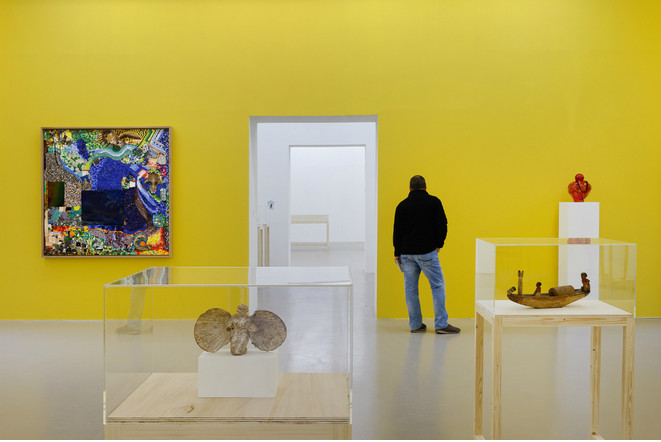station flash
" Cosmopolitiques " ? Station flash of the Space brain laboratory, opens up a new trans-disciplinary exchange which focuses on the political issues raised by the project of a world common to both human and non-human beings, in the time of the Anthropocene. As ecological upheavals intensify, our vital relationship to the Earth and to the non-human entities that inhabit it is revealed both in thinking and in the imagination at the heart of our concerns. Anthropocentrism, the predominance of scientific abstractions, the compartmentalization of disciplines, the anticipation of risks through calculation, based on the ancient division between nature and culture, continue to be used as models in our techno-sphere. The fragile balance of biodiversity and the manifest strength of the elements, drive us to imagine other political practices, truly open to transformative interactions that connect humans to non-humans. Resonating with the engagement present in the project, The Middle Earth by Maria Thereza Alves and Jimmie Durham, currently on show at the IAC, the idea is to deal with the possibilities of a pro- Earth policy. How to consider the vital relationship of co-existence between the plurality of living things within the context of a political debate? What are the conditions necessary for plants, animals, minerals, microbes, constellations and clouds to become participants in the debate? Within a world of living and moving multiplicities, how should dogmas of universalism, heirs to western modernity be treated? In a mode of collective exchange, this station proposes to address the multiple perspectives carried by a cosmopolitics.
Study day
Open to the public on Wednesday, May 16th 2018.
From 10:00 to 12:30 a.m and from 02:00 to 05:00 p.m, at the IAC Auditorium.
With Nathalie Ergino, curator of the exhibition The Middle Earth, Mediterranean Project by Maria Thereza Alves & Jimmie Durham.
Discover the summary of Alys Demeure, research assistant.
→ Cosmopolitiques ? Synthèse de la station flash du 16-05-18 (pdf/french/3 p.)
Participants
Denis Cerclet
Antropologist, lecturer at Université Lumière Lyon 2
Olivier Hamant
Biologist, research Director at the Laboratory for the reproduction and development of Plants at the École Normale Supérieure de Lyon, associate researcher at the Sainsbury laboratory, Cambridge (England), associate professor at the University of Kumamoto (Japan)
Hélène Meisel
In charge of research and exhibition at centre Pompidou/Metz
Pierre Montebello
Philosopher, modern and contemporary philosophy professor at University of Toulouse, author of Métaphysiques cosmomorphes, la fin du monde humain
Cyrille Noirjean
Director of URDLA (International center estampe & book), psychoanalyst (member of the International Lacanian Association)
Arnauld Pierre
Art historian, professor at Université Paris IV-Sorbonne
Jean-Louis Poitevin
Doctor of philosophy, writer and art critic
Alexandre Wajnberg
Scientist journalist at the RTBF (Journal parlé de Radio Une, Brussels)
Jean-Jacques Wunenburger
Professor Emeritus of Philosophy, Honorary Dean of the Philosophy Department of the Université Lyon 3 (2000-2010), former Director of the Institute for Philosophical research of Lyon (2004-2011), President of the Gaston Bachelard International Association, Co-director of the International Center for Research on the Imaginary
And the artists : Clarissa Baumann, Benjamin Blaquart, FRAME (Alys Demeure, Jérôme Grivel, Héloïse Lauraire, Sandra Lorenzi, Stéphanie Raimondi), Célia Gondol, Linda Sanchez, Vahan Soghomonian, Mengzhi Zheng, Florian Varennes
Works under study
The Middle Earth
Mediterranean Project by Maria Thereza Alves & Jimmie Durham
Exhibition from 03/02/18 to 05/27/18
Institut d’art contemporain, Villeurbanne/Rhône-Alpes
Lectures / Talks
Listen the lectures and talks during the study day (mp3/french)
Nathalie Ergino
→ Introduction and presentation of the participants [07:31]
In the morning. Lectures of Olivier Hamant and the students of the thematic group "Anthropocène", École Normale Supérieure (ENS Lyon) «Panorama biologique, philosophique et littéraire d’une solution écologique : la sous-optimalité»
Olivier Hamant
«Introduction et définition de la sous-optimalité»
→ Partie 1 [16:58]
→ Partie 2 [16:55]
Kamela Nikolla
→ «La sous-optimalité en biologie et l'intelligence artificielle» [23:04]
Clémentine Lessard
«La sous-optimalité comme question philosophique: est-il possible d'étendre l'idée de sous-optimalité à la terre considérée comme un individu?»
→ Partie 1 [16:31]
→ Partie 2 [16:38]
Raphaëlle Raynaud
«Quand la littérature explore les enjeux sociaux et politiques de la sur-optimalité»
→ Partie 1 [26:21]
→ Partie 2 [26:54]
In the afternoon. Lectures of Space brain laboratory regular participants.
Pierre Montebello
«Cosmopolitique de la Terre»
→ Partie 1 [19:53]
→ Partie 2 [20:19]
→ Partie 3 [15:25]
Denis Cerclet
«Perception, action et politique»
→ Partie 1 [27:03]
→ Partie 2 [21:05]
Sandra Lorenzi
«De l’archéologie comparée à l’Histoire globale : un art à l’épreuve du Politique, au regard de l’exposition The Middle Earth»
→ Partie 1 [23:40]
→ Partie 2 [27:06]
Ressources
Extend the experience of the study day
Olivier Hamant
Research Director at the Laboratory for the reproduction and development of Plants, École Normale Supérieure (ENS Lyon)
→Introduction et définition de la sous-optimalité (pdf slide show/french/37 p.)
Morgane Gaillard
Student of the thematic group "Anthropocène", École Normale Supérieure (ENS Lyon)
→ Courir : éprouver les limites du rythme optimal. Bribes de réflexion anthropologique, sociologique et philosophique sur le temps anthropocénique inspirées des ouvrages d’Hartmut Rosa et Guillaume Le Blanc (pdf/french/3 p.)


